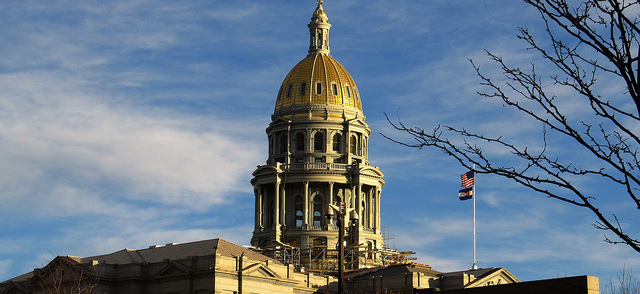
The Denver Metro Chamber of Commerce announced its position on five bills working their way through the Colorado General Assembly.
SCR15-002 Ballot Procedure Citizen Initiated Amendments/Sen. Ellen Roberts (R-Durango) and Sen. Pat Steadman (D-Denver)
Summary: The resolution establishes a new two-tier election process for an initiative petition to amend the state constitution. It creates the following three-step process:
- Constitutional measures would be placed on an even-year general election ballot after title setting and signature requirements are met. This vote would authorize the measure for further review and a final vote at the following odd-year election.
- If authorized by voters, legislative council would conduct at least one public hearing in each congressional district on the policy, fiscal and administrative impacts of the proposed amendment.
- Lastly, a vote on the next general election ballot in the odd year would be held for final approval by Colorado voters.
The Chamber supports SCR15-002. The Chamber values the right for Coloradans to petition state government; it’s a founding principle of our state. However, over the past 20 years special interests have used the ballot initiative process to bring forward their own agendas for amending the Constitution. This resolution would place before the voters a proposal that affirms the value and importance of the Colorado Constitution by establishing a thorough review and education process to amend our state’s most important governing document. This change would not apply to initiatives to remove provisions already existing in the constitution, nor does it impact the process for citizen initiatives that impact statutes.
SB15-258 Coordinated Review of CO2 Emissions Reduction Measures/Sen. John Cooke (R-Greeley)
Summary: The bill requires that before the Colorado air quality control commission adopts a state plan for the reduction of carbon dioxide emissions by Colorado electric utilities, in accordance with federal regulations, the proposed plan be reviewed by the Colorado Public Utilities Commission (PUC) to determine the likely impact on the rates paid for electricity by consumers. Additionally, the PUC evaluates a report summarizing the effects of the plan on rates, reliability, Colorado’s economy and need to be adopted by both houses of the general assembly in a joint resolution approved by a majority vote.
The Chamber supports SB15-258 because it provides more opportunity for input, giving voice to stakeholders, which we believe supports collaboration, pragmatism and ultimately creates the best outcomes for Colorado.
HB15-1331 Colorado Overtime Fairness For Employees Act/Rep. Max Tyler (D-Lakewood) and Sen. Michael Merrifield (D-Colorado Springs)
Summary: The bill limits the discretion of the director of the division of labor in creating an exemption to Colorado’s regulatory overtime requirements for employees that are administrative, executive, supervisor or professional. The bill sets a minimum salary requirement for the director of the division of labor to apply the exemption equaling three times the Colorado minimum wage. Because the Colorado state minimum wage automatically adjusts for inflation under the Colorado Constitution, by linking the minimum salary for the exemption to apply to minimum wage, that salary will also adjust with inflation.
The Chamber opposes HB15-1331 because the bill interferes with employer discretion in managing personnel matters. Additionally, the bill deals with a complex issue and was introduced without stakeholder engagement.
HB15-1342 Personnel File Right of Inspection/Rep. Joe Salazar (D-Thornton)
Summary: The bill allows an employee or former employee to inspect or request copies of his or her personnel file within 30 days of a written request. The bill authorizes an employee or former employee to provide written rebuttal information to the employer, requires information to be added to the employee’s personnel file and for the rebuttal information to accompany any transmittal or disclosure from the file made to a third party. The bill provides remedies to an employee or former employee if an employer or former employer fails to comply with the requirements of the bill.
The Chamber opposes HB15-1342. While the Chamber supports transparency, we believe this bill limits those documents that you can add to an employee’s personnel file, which ultimately interferes with an employer’s discretion in managing personnel matters.
HB15 – 1348, Urban Redevelopment Fairness Act/Rep. Hullinghorst, Rep. Lawrence and Sen. Heath, Sen. Balmer
Summary: This bill makes a number of changes to the urban renewal authority (URA) law. The bill requires one representative from the affected counties, one representative from affected special districts and one representative from affected school districts be included on the URA board of the municipal governing body. Each board of county commissioners and each public body are required to meet and attempt to negotiate an agreement governing the types and limits of tax revenues of each taxing entity to be allocated to the urban renewal plan.
In the absence of an agreement between the municipality and any taxing entity, the bill prohibits the percentage of property tax increment revenues of any public body that may be allocated to the URA from exceeding the percentage of municipal sales tax increment revenues allocated to the URA under the provisions of the urban renewal plan.
The Chamber opposes HB15-1348. While we support the inclusion of affected taxing jurisdictions to the governing board, we oppose the establishment of a fixed allocation between property and sales tax increments in statute, as this will have a chilling effect on the negotiations among the affected tax entities and the prospect for negotiating future tax increment financing arrangements.
Click here to view all the Chamber’s positions this session.
Jennifer Jones is the director of public affairs for the Denver Metro Chamber of Commerce.
[Photo by: Ken Lund]
